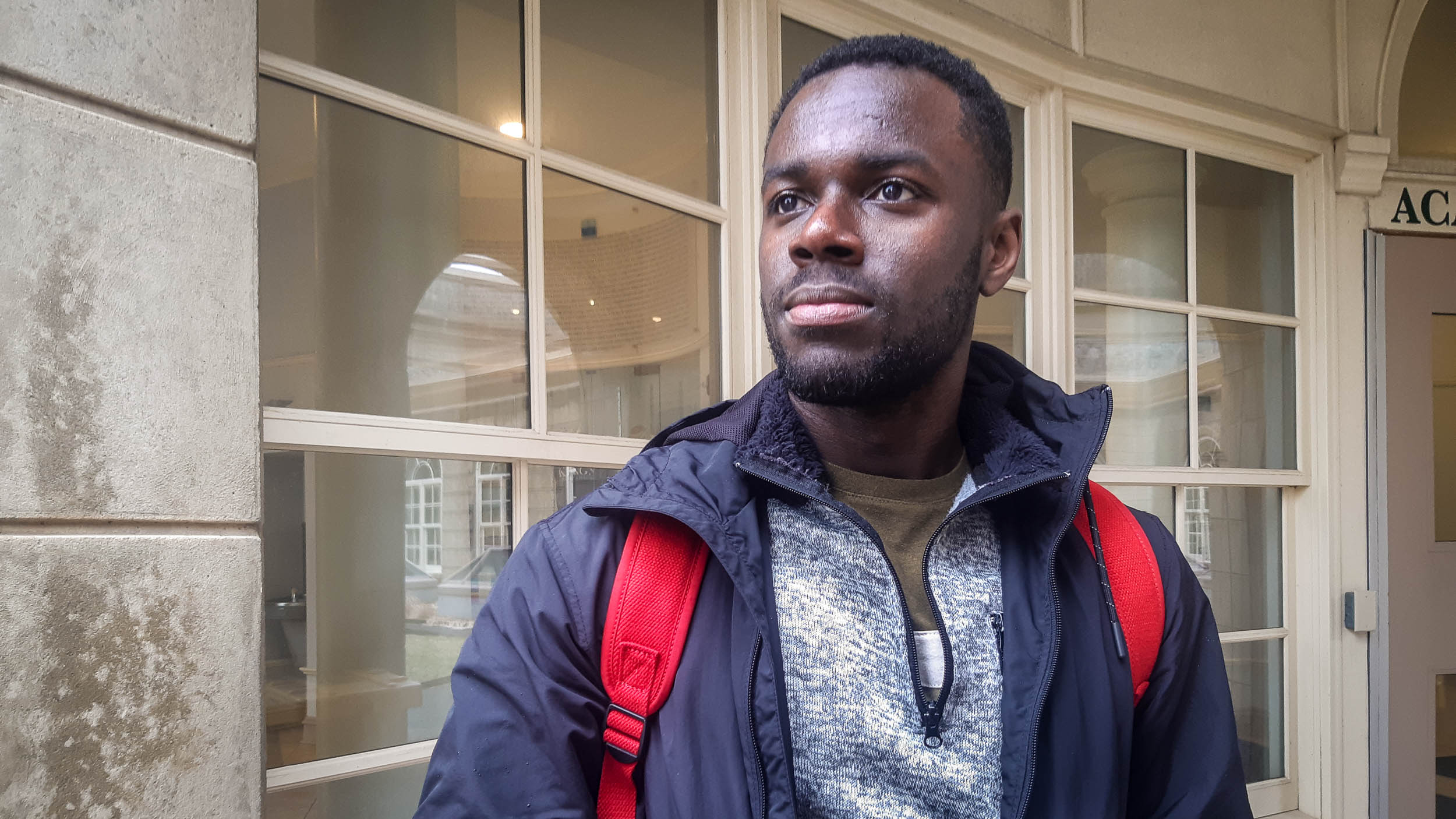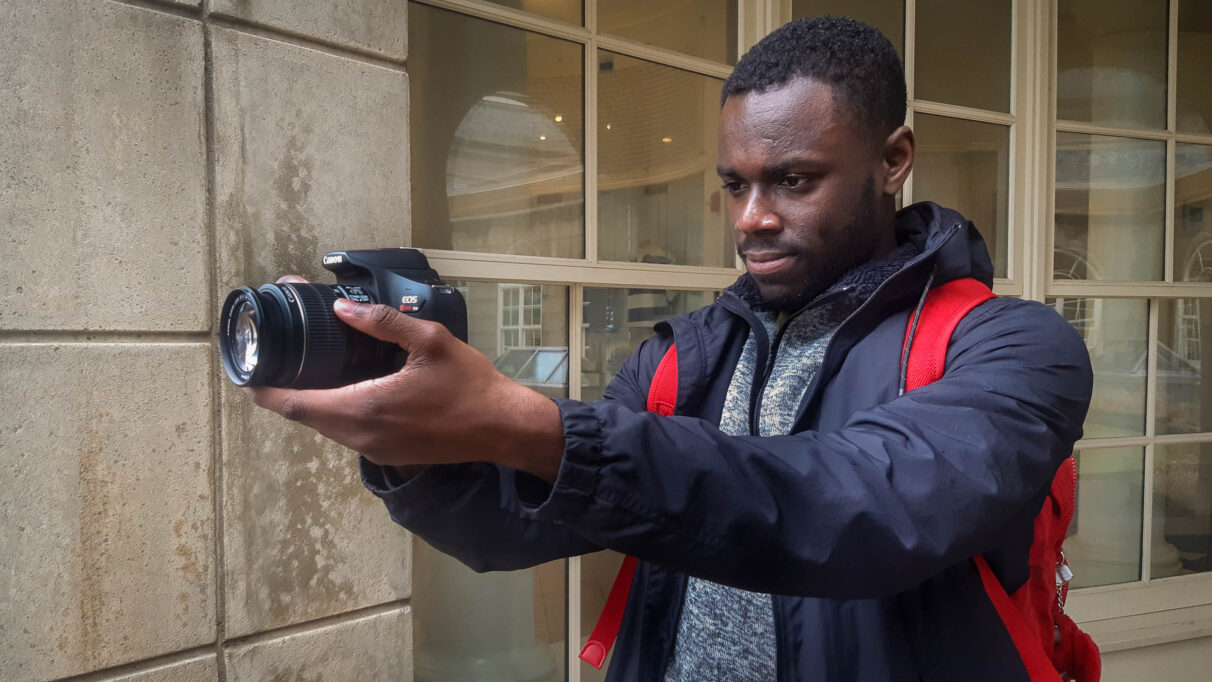‘I don’t think it was anything like I’d experienced up to that point, even being a hurricane veteran’

caption
Karsten Greene poses for a photo in Halifax.Sheltering in place in Miami as Hurricane Irma bears down
Karsten is from Antigua and Barbuda, a small island country with a tight community located in the Caribbean. He recalls a childhood spent under the tropical sun and the general laid-back, relaxed attitude characteristic of islands.
Karsten’s primary passion was always film. He was just 16 when he graduated from high school and moved to Miami to study filmmaking at a community college. Although he had been to the U.S. before to visit extended family, this was the first time he would be away from home for a long period of time. He recalls feeling limited by the car-centric infrastructure and having to rely on others for mobility. “I’ve always liked doing things on my own.”
In September 2017, just a month after Karsten had moved to Miami, Hurricane Irma, one of the most powerful Atlantic hurricanes on record, made its way to Florida after wreaking havoc on neighboring islands as it churned across the Caribbean.
I chose Miami specifically because I had family there and so that means I would have somewhere to stay. I was staying with two of my cousins and one of my cousin’s daughters.
Irma was not the first hurricane to hit that year. Hurricane Harvey had just happened, so we were well aware that this was hurricane season. I remember keeping close track in the days leading up to it, because the trajectory was passing through Antigua. Antigua is a pretty small island, right between the Caribbean and the Atlantic Ocean. We are prime targets for hurricanes. I experienced quite a few of them growing up. So I was a bit concerned for everyone back home.
It was the first hurricane that I was experiencing away from home. The days before felt kind of funny. I was not in my natural element. I wasn’t with my mother.
At that point, from what we gathered in the news, it was building up to be a category 5 hurricane. That was a bit new, because I don’t think any other hurricane that I experienced up to that point was that severe. My mom lived through Hurricane Andrew back in the ‘90s. She’s told me stories about how that completely totaled Antigua, and I know that it completely totaled Florida too. They were saying on the news this has a possibility to be just as destructive as Hurricane Andrew was. It was not only headed directly towards Florida, we were expected to get hit by the eye of the hurricane. This was pretty scary.
I remembered the day before it actually hit, my mom was calling me and asking “Do you want me to book you a flight out of there? Stay with your aunt in New York for the time at least?” They were saying there’s a possibility that people would have to move out of their homes and she didn’t want that for me at all. I was trying to calm her down while also calming myself down because, at this point, the gravity of the situation was really hitting me.
Just hours before the hurricane happened, me and my cousins went out to stock up on groceries. We wanted to make sure we had drinking water, batteries and flashlights. Once we got home, we had to start prepping the house. We had to take these shutters and screw them onto our windows. We weren’t sure if we were gonna lose power or not, but we wanted to be prepared.

caption
Karsten Greene poses for a photo in Halifax.A family friend of ours, one of my mom’s old friends who also lived in the area, came to stay with us that night just because she wanted to have some company. All five of us stayed up, talked to each other and made jokes. We bought these flashlights, and when we lost power, we actually used these flashlights to put on little puppet shows to pass time. I was thinking: I’m not going through this alone. I’m here with people. I’m here with family.
When it got late in the night, you could hear the banging on the shutters. I tried my best to go to sleep, but it was difficult. I remember it being very dark and hearing rattling sounds. I was expecting the worst. You don’t know what’s happening. I was even imagining there was gonna come a point where the roof was gonna fly off. There was that concern the whole time.
In the morning after I woke up, it was still raining outside. Me and one of my cousins went outside to explore. It was completely bright, the sun was out, the sky was clear and it was very quiet. Unusually quiet. Even the sound of birds seemed to be absent. It made it feel eerie. There was a lot of leaves, a lot of broken trees. I could smell the scent of rain rising up from the ground.
To our surprise, our neighborhood wasn’t as totaled as we thought it was. The hurricane actually shifted at the very last moment. We didn’t get hit by the eye, thank God. There were some trees that were broken, dented lamp posts, but nothing I’ve never seen before.
So I was thinking to myself, all right, this could have been way worse.That was until we ventured outside of our neighborhood. We went to the supermarket that has this really big tree in the middle of the parking lot, and it was literally ripped out from the roots, laying on its side. That was the image that stuck with me, this massive tree just being ripped out of the roots like this. We were thinking: Good God, what happened here?
And it was a similar scene throughout the rest of the city. There was still flooding in certain areas, a lot of places still didn’t have power, the roads were closed off because they were blocked by trees. It was like the apocalypse. I felt lucky, but I also felt bad for everyone else around me. It’s a weird thing to think, but it felt like, “Why me? Why spare me?”
When I went to school and spoke to some people about their experiences, some of them still didn’t have power. There were community efforts to help with hurricane relief; when my cousin was driving to school, he encountered a group of nuns helping clean up the roads.
It was a roller coaster, I don’t think it was anything like I’d experienced up to that point, even being a hurricane veteran. I feel like that’s bigger than you or me.
I’d always known climate change was real, but this being a category 5 hurricane, that hadn’t been seen in decades. And yet this was happening within my lifetime. It really signaled the urgency of it. Hurricane Irma was the point where it all became very clear. When you’re actually living it, it’s terrifying.
I’m under no delusion that we have some rough years ahead of us. This is where having some faith goes a long way, at least for me, even in the face of terrible odds. What gives me hope is that, at my core, I believe in humanity. I believe in humans. I believe we are a resilient lot. We’ve been through a lot. We’ve been through plagues, we’ve experienced world wars and yet, we’re still here. I’d like to believe that we will still be here in a 100 years time. My children, my grandchildren are still gonna be here and I want there to be something left behind for them.
About the author

Karsten Greene as told to Nour Hafid
